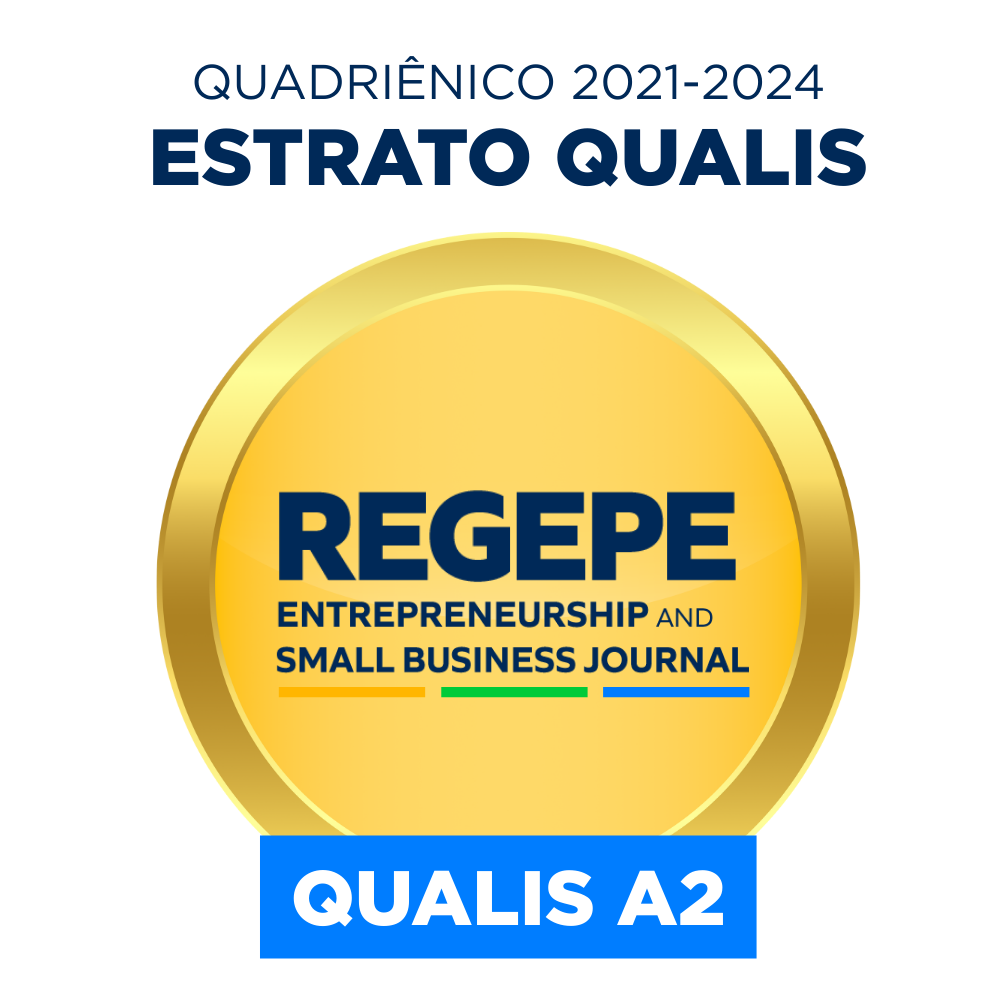Antecedentes do uso de mídias sociais e seus efeitos na resiliência e inovação de startups
DOI:
10.14211/regepe.esbj.e2062Palavras-chave:
Mídias sociais, Resiliência organizacional, Inovação.Resumo
Objetivo do estudo: Examinar quais fatores antecedentes favoreceram o uso de mídias sociais e que, substanciados na resiliência organizacional, suscitaram inovações em startups em tempos de pandemia. Metodologia/abordagem: Uma survey foi realizada em startups localizadas nas regiões Sul e Sudeste do Brasil, listadas na StartupBase, e obteve retorno de 119 questionários respondidos pelos gestores. Para análise das hipóteses, utilizou-se a modelagem de equações estruturais. Principais resultados: O ambiente, mensurado pela pressão externa, e a organização, mensurada pelas dimensões de prontidão interna e benefícios estratégicos, figuram como antecedentes do uso de mídias sociais. O uso das mídias sociais tem efeito direto e positivo na resiliência organizacional e, mediado pela resiliência organizacional, tem efeito positivo na inovação. Contribuições teóricas/metodológicas: Amplia-se a literatura ao analisar antecedentes e consequências do uso de mídias sociais, particularmente relacionado à capacidade de resiliência organizacional e promoção da inovação. Relevância/originalidade: Evidências empíricas indicam que as mídias sociais podem auxiliar no desenvolvimento da resiliência nas startups e, consequentemente, promover a inovação em tempos de pandemia. Contribuições sociais/para a gestão: O enfoque nas mídias sociais revelou que estas podem gerar benefícios em períodos de restrições, já que o uso das mídias sociais substanciadas na resiliência organizacional possibilita a interação e criação de valor.
Downloads
Referências
Akgün, A. E., & Keskin, H. (2014). Organisational resilience capacity and firm product innovativeness and performance. International Journal of Production Research, 52(23), 6918–6937. https://doi.org/10.1080/00207543.2014.910624
Anderson, N., Potočnik, K., & Zhou, J. (2014). Innovation and Creativity in Organizations: A state-of-the-science review, prospective commentary, and guiding framework. Journal of Management, 40(5), 1297–1333. https://doi.org/10.1177/0149206314527128
Bernoff, J. & Schadler, T. (2013). Empowered: unleash your employees, energize your customers, transform your business. Harvard Business Press, Cambridge.
Beuren, I. M., & Santos, V. dos. (2019). Enabling and coercive management control systems and organizational resilience. Revista Contabilidade & Finanças, 30(81), 307–323. https://doi.org/10.1590/1808-057x201908210
Bhamra, R., Dani, S., & Burnard, K. (2011). Resilience: the concept, a literature review and future directions. International Journal of Production Research, 49(18), 5375–5393. https://doi.org/10.1080/00207543.2011.563826
Bhimani, H., Mention, A.-L., & Barlatier, P.-J. (2019). Social media and innovation: A systematic literature review and future research directions. Technological Forecasting and Social Change, 144, 251–269. https://doi.org/10.1016/j.techfore.2018.10.007
Buliga, O., Scheiner, C. W., & Voigt, K.-I. (2016). Business model innovation and organizational resilience: towards an integrated conceptual framework. Journal of Business Economics, 86(6), 647–670. https://doi.org/10.1007/s11573-015-0796-y
Cao, Y., Ajjan, H., Hong, P., & Le, T. (2018). Using social media for competitive business outcomes. Journal of Advances in Management Research, 15(2), 211–235. https://doi.org/10.1108/JAMR-05-2017-0060
Casprini, E., Di Minin, A., & Paraboschi, A. (2019). How do companies organize nascent markets? The BlaBlaCar case in the inter-city shared mobility market. Technological Forecasting and Social Change, 144, 270–281. https://doi.org/10.1016/j.techfore.2018.01.012
Chau, P. Y. K., & Hui, K. L. (2001). Determinants of Small Business EDI Adoption: An Empirical Investigation. Journal of Organizational Computing and Electronic Commerce, 11(4), 229–252. https://doi.org/10.1207/S15327744JOCE1104_02
Corral de Zubielqui, G., & Jones, J. (2020). How and when social media affects innovation in start-ups. A moderated mediation model. Industrial Marketing Management, 85, 209–220. https://doi.org/10.1016/j.indmarman.2019.11.006
Corral de Zubielqui, G., Fryges, H., & Jones, J. (2019). Social media, open innovation & HRM: Implications for performance. Technological Forecasting and Social Change, 144, 334–347. https://doi.org/10.1016/j.techfore.2017.07.014
Coutu, D.L. (2002). How resilience works. Harvard Business Review, 80(5), 46-55. https://hbr.org/2002/05/how-resilience-works
Dodokh, A., & Al-Maaitah, M. A. (2019). Impact of Social Media Usage on Organizational Performance in the Jordanian Dead Sea Cosmetic Sector. European Journal of Business and Management. https://doi.org/10.7176/EJBM/11-2-09
Donthu, N., & Gustafsson, A. (2020). Effects of COVID-19 on business and research. Journal of Business Research, 117, 284–289. https://doi.org/10.1016/j.jbusres.2020.06.008
Drummond, C., McGrath, H., & O’Toole, T. (2018). The impact of social media on resource mobilisation in entrepreneurial firms. Industrial Marketing Management, 70, 68–89. https://doi.org/10.1016/j.indmarman.2017.05.009
Gopalakrishnan, S., & Damanpour, F. (1997). A review of innovation research in economics, sociology and technology management. Omega, 25(1), 15–28. https://doi.org/10.1016/S0305-0483(96)00043-6
Hair, J.F., Black, W.C., Babin, B.J., Anderson, R.E., & Tatham, R.L. (2009). Análise multivariada de dados. Bookman, Porto Alegre.
Hsieh, Y.-J., & Wu, Y. J. (2019). Entrepreneurship through the platform strategy in the digital era: Insights and research opportunities. Computers in Human Behavior, 95, 315–323. https://doi.org/10.1016/j.chb.2018.03.033
Jilani, M. M. A. K., Fan, L., Nusrat, M., & Uddin, Md. A. (2019). Empirical study on the antecedents predicting organizational resilience of small and medium enterprises in Bangladesh. Journal on Innovation and Sustainability RISUS, 10(2), 138–145. https://doi.org/10.23925/2179-3565.2019v10i2p138-145
Kantur, D., & İşeri-Say, A. (2012). Organizational resilience: A conceptual integrative framework. Journal of Management & Organization, 18(6), 762–773. https://doi.org/10.5172/jmo.2012.18.6.762
Kaplan, A. M., & Haenlein, M. (2010). Users of the world, unite! The challenges and opportunities of Social Media. Business Horizons, 53(1), 59–68. https://doi.org/10.1016/j.bushor.2009.09.003
Kuckertz, A., Brändle, L., Gaudig, A., Hinderer, S., Morales Reyes, C. A., Prochotta, A., Steinbrink, K. M., & Berger, E. S. C. (2020). Startups in times of crisis – A rapid response to the COVID-19 pandemic. Journal of Business Venturing Insights, 13, e00169. https://doi.org/10.1016/j.jbvi.2020.e00169
Kuhn, K., Galloway, T., & Collins-Williams, M. (2016). Near, far, and online: small business owners’ advice-seeking from peers. Journal of Small Business and Enterprise Development, 23(1), 189–206. https://doi.org/10.1108/JSBED-03-2015-0037
Kwok, L., & Yu, B. (2013). Spreading Social Media Messages on Facebook. Cornell Hospitality Quarterly, 54(1), 84–94. https://doi.org/10.1177/1938965512458360
Lengnick-Hall, C. A., & Beck, T. E. (2005). Adaptive Fit Versus Robust Transformation: How Organizations Respond to Environmental Change. Journal of Management, 31(5), 738–757. https://doi.org/10.1177/0149206305279367
Lengnick-Hall, C. A., Beck, T. E., & Lengnick-Hall, M. L. (2011). Developing a capacity for organizational resilience through strategic human resource management. Human Resource Management Review, 21(3), 243–255. https://doi.org/10.1016/j.hrmr.2010.07.001
Linnenluecke, M. K. (2017). Resilience in Business and Management Research: A Review of Influential Publications and a Research Agenda. International Journal of Management Reviews, 19(1), 4–30. https://doi.org/10.1111/ijmr.12076
Majeed, S. (2011). The impact of competitive advantage on organizational performance. European Journal of Business and Management, 3(4), 191-196. https://www.iiste.org/Journals/index.php/EJBM/article/view/306/193
McKisney, Q. (2007). How companies are marketing online: A McKinsey global survey. The McKinsey Quarterly, 1(1) 1-10. https://sachinuppal.files.wordpress.com/2008/03/mckinsey-how-companies-are-using-online-marketing.pdf
Mention, A.L., Barlatier, P.J., & Josserand, E. (2019). Using social media to leverage and develop dynamic capabilities for innovation. Technological Forecasting and Social Change, 144(1), 242-250. https://doi.org/10.1016/j.techfore.2019.03.003
Näswall, K., Kuntz, J., Hodliffe, M., & Malinen, S. (2015). Employee resilience scale (EmpRes) measurement properties. Resilient Organizations Research Programme: Christchurch, New Zealand. https://www.resorgs.org.nz/wp-content/uploads/2019/08/Resilient_Organisations_2015-04_Employee_Resilience_Scale.pdf
Nuryanto, U. W., Djamil MZ, M., Sutawidjaya, A. H., & Saluy, A. B. (2020). The Effect of Organizational Performance, Competitive Advantage on the Financial Sector of Chemical Manufacturing Industry in Banten Province. Ilomata International Journal of Tax and Accounting, 1(4), 225–242. https://doi.org/10.52728/ijtc.v1i4.141
Ogink, T., & Dong, J. Q. (2019). Stimulating innovation by user feedback on social media: The case of an online user innovation community. Technological Forecasting and Social Change, 144, 295–302. https://doi.org/10.1016/j.techfore.2017.07.029
Olanrewaju, A.-S. T., Hossain, M. A., Whiteside, N., & Mercieca, P. (2020). Social media and entrepreneurship research: A literature review. International Journal of Information Management, 50, 90–110. https://doi.org/10.1016/j.ijinfomgt.2019.05.011
Olof Lagrosen, S., & Grundén, K. (2014). Social media marketing in the wellness industry. The TQM Journal, 26(3), 253–260. https://doi.org/10.1108/TQM-12-2013-0129
Parveen, F., Jaafar, N.I., & Ainin, S. (2013). Social media usage among businesses: a website content analysis. Asian Journal of Information Technology, 12(10), 342-348. https://medwelljournals.com/abstract/?doi=ajit.2013.342.348
Parveen, F., Jaafar, N. I., & Ainin, S. (2015). Social media usage and organizational performance: Reflections of Malaysian social media managers. Telematics and Informatics, 32(1), 67–78. https://doi.org/10.1016/j.tele.2014.03.001
Parveen, F., Jaafar, N. I., & Ainin, S. (2016). Social media’s impact on organizational performance and entrepreneurial orientation in organizations. Management Decision, 54(9), 2208–2234. https://doi.org/10.1108/MD-08-2015-0336
Rodríguez-Sánchez, A., Guinot, J., Chiva, R., & López-Cabrales, Á. (2021). How to emerge stronger: Antecedents and consequences of organizational resilience. Journal of Management & Organization, 27(3), 442–459. https://doi.org/10.1017/jmo.2019.5
Scuotto, V., Del Giudice, M., & Carayannis, E. G. (2017). The effect of social networking sites and absorptive capacity on SMES’ innovation performance. The Journal of Technology Transfer, 42(2), 409–424. https://doi.org/10.1007/s10961-016-9517-0
Spekman, R.E., & Dotson, E. (2010). Using social media in the B2B context. Case Study No. UVA-M-0778. Darden Business Publishing, University of Virginia. http://papers.ssrn.com/sol3/papers.cfm?abstract_id=1584113.
Trainor, K. J., Andzulis, J. (Mick), Rapp, A., & Agnihotri, R. (2014). Social media technology usage and customer relationship performance: A capabilities-based examination of social CRM. Journal of Business Research, 67(6), 1201–1208. https://doi.org/10.1016/j.jbusres.2013.05.002
Wang, Y., & Hajli, N. (2017). Exploring the path to big data analytics success in healthcare. Journal of Business Research, 70, 287–299. https://doi.org/10.1016/j.jbusres.2016.08.002
Zhang, Y., Sun, J., Yang, Z., & Wang, Y. (2018). Mobile social media in inter-organizational projects: Aligning tool, task and team for virtual collaboration effectiveness. International Journal of Project Management, 36(8), 1096–1108. https://doi.org/10.1016/j.ijproman.2018.09.003
Zhao, Y. L., Libaers, D., & Song, M. (2015). First Product Success: A Mediated Moderating Model of Resources, Founding Team Startup Experience, and Product-Positioning Strategy. Journal of Product Innovation Management, 32(3), 441–458. https://doi.org/10.1111/jpim.12236
Zhu, K., Kraemer, K. L., & Dedrick, J. (2004). Information Technology Payoff in E-Business Environments: An International Perspective on Value Creation of E-Business in the Financial Services Industry. Journal of Management Information Systems, 21(1), 17–54. https://doi.org/10.1080/07421222.2004.11045797
Zhu, K., Kraemer, K. L., & Xu, S. (2006). The Process of Innovation Assimilation by Firms in Different Countries: A Technology Diffusion Perspective on E-Business. Management Science, 52(10), 1557–1576. https://doi.org/10.1287/mnsc.1050.0487
Zubielqui, G.C., & Jones, J. (2020). How and when social media affects innovation in start-ups. A moderated mediation model. Industrial Marketing Management, 85(1), 209-220. https://doi.org/10.1016/j.indmarman.2019.11.006
Zubielqui, G.C., Fryges, H., & Jones, J. (2019). Social media, open innovation & HRM: implications for performance. Technological Forecasting and Social Change, 144(1), 334-347. https://doi.org/10.1016/j.techfore.2017.07.014

Downloads
Publicado
Métricas
Visualizações do artigo: 2075 PDF downloads: 228 Viewer (xml, epub, html) downloads: 0 Mobile downloads: 0
Como Citar
Edição
Seção
Licença
Copyright (c) 2023 Mikaéli da Silva Giordani, Daiani Schlup, Ilse Maria Beuren

Este trabalho está licenciado sob uma licença Creative Commons Attribution 4.0 International License.
Autores que publicam nesta revista concordam com os seguintes termos:
- O(s)/A(s) autor(es)/autora(s) autorizam a publicação do texto na revista;
- A revista não se responsabiliza pelas opiniões, ideias e conceitos emitidos nos textos, por serem de inteira responsabilidade de seus autores/autoras;
- Autores/autoras mantêm os direitos autorais e concedem à revista o direito de primeira publicação, com o trabalho publicado sob a Licença CC BY 4.0
, que permite o compartilhamento do trabalho com reconhecimento da autoria e publicação inicial nesta revista;
- Autores/autoras são permitidos e encorajados a postar seu trabalho (Versão submetida, Versão aceita [Manuscrito aceito pelo autor/autora] ou Versão publicada [Versão do registro]) online, por exemplo, em repositórios institucionais ou preprints, pois isso pode levar a trocas produtivas, bem como a citações anteriores e maiores de trabalhos publicados. A REGEPE pede como condição política para os autores/autoras que indiquem/vinculem o artigo publicado com DOI. Veja o Efeito do Acesso Livre.















